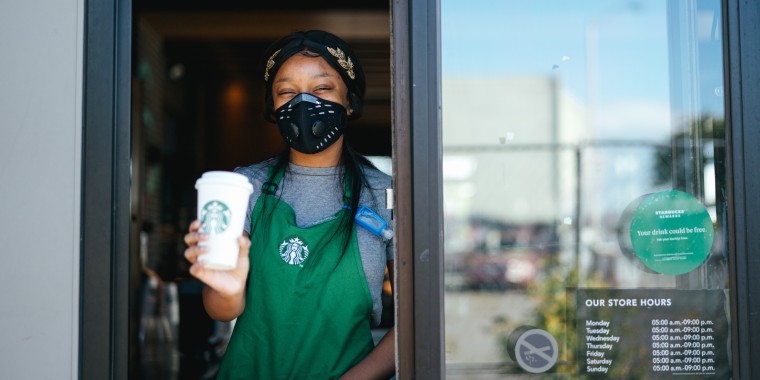As part of Starbucks' commitment to improving inclusion and diversity within its workforce, the company said Wednesday that it plans to start a mentorship program, partner with non-profits like United Way to place outreach workers in its cafes and hire more minorities to work in corporate roles.
By 2025, the Seattle-based coffee company vows to have Black, Indigenous and people of color represent 30% of its corporate employees at all levels and at least 40% of retail and manufacturing jobs.
At present, about 47% of those overall workers identify as a minority, but the company falls short of the target moving up the hierarchy to store managers or regional directors. In 2019, only 15% of Starbucks' senior leadership roles were held by people of color.
This data was also shared publicly on Wednesday, along with the chain's past three years of EEO-1 reports, a federally mandated survey about a company's workforce demographic.
Like many recent corporate initiatives, the pledge follows months-long protests against racial inequality and police brutality in response to the killings of George Floyd, Breonna Taylor and Ahmaud Arbery.
But Starbucks has been reckoning with racial bias for some time now. In April 2018, an employee in a Philadelphia Starbucks called the police on two Black men, Rashon Nelson and Donte Robinson, in a Philadelphia Starbucks, who were waiting for a business meeting to start before ordering anything. Nelson said he asked to use the restroom immediately after walking into the Starbucks but was told it was for paying customers only. A video of the incident went viral, sparking outrage and accusations of racism against police and the company.
Then, in May of the same year, the company closed down all of its U.S. company-owned cafes for a day to host a racial bias training. Starbucks also commissioned an independent civil rights assessment in response to the incident and, the following year, hired Nzinga Shaw as its first global chief inclusion and diversity officer.
In 2018, following the Philadelphia arrests, the company modified its policy to let anyone sit in its cafes, or use its restrooms, even if they don’t buy anything, which placed more pressure on baristas who might not be equipped to deal with people in crisis. Now, Starbucks is planning to hire outreach workers in its stores to reduce law enforcement intervention.
"This kind of outreach further ensures that Starbucks locations are welcoming places for all," Starbucks CEO Kevin Johnson wrote in a letter to employees.
To help implement these measures throughout the company, Starbucks will create an Inclusion and Diversity Executive Council — tied to executive compensation — that will join the Board Diversity Alliance, which includes other corporate brands like Uber and Macy's. In addition, Starbucks' foundation will contribute $1.5 million in neighborhood grants and $5 million on an initiative to support nonprofits that serve minority youths.

